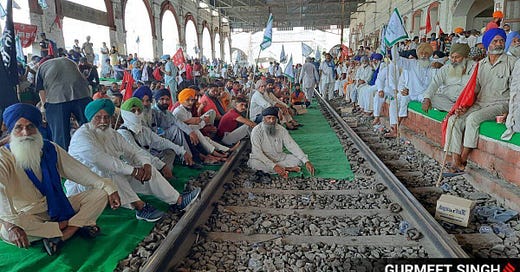Learning by Proxy | Farm Bill
Say you were selling a product, would you have the government set the price for you or would you like to have flexibility at your end?
On the eve of Guru Nanak Jayanti, a group of Punjabi farmers camped at the border of Delhi cooked food for the night. The government asked them to move to designated areas so that talks could be held on the 3rd of December. A couple of days before, the Prime Minister of the country flew to visit vaccine labs across the country rather than visit the farmers to help them understand his vision.
What is the point all the marketing this government engages in if you are never there when trouble foments?
Farm Bill
When the European first came to India, they lusted after the Indian spices which were of very high quality. Also, they could not grow them locally in Europe and trading with India became a necessary evil. Indian farmers and kingdoms were able to quote the price they wished because the demand was high and farm output was not as much.
Over time, as the British chased all the rest of the Europeans out and consolidated power, they started forcing farmers to produce crops that they needed. Apart from food grains, poppy, tea and cotton were important for the British trade. What was the point of consolidating power if the Indians could charge what they wished?
For this, the first regulated market was set up in the Hyderabad Residency in 1886. They also passed the Berar Grain and Cotton Market Act of 1887 which allowed the British to declare any area as a market in the designated region and also set up a committee to regulate the trade (and prices).
The Agri-markets were tools of oppression. After Independence, a new argument took root that preserved this institution; that farmers would not be able to find the right price for their produce and would be required to sell their produce at throwaway prices. The supposed high cost of marketing resulted in the Agriculture Produce Market Committee which each state government could setup. This may have also been true! Half the country depending on farming for their income; most of the rest were also poor and we were copying USSR at everything.
Since Independence, this has been true, till the Farm Bill 2020 arrived. First of all, the manner in which the bill was passed did make the contents of the bill seem far more sinister.
On Sunday, things hit a new low when the Bills were passed by a voice vote despite opposition MPs asking for a division, i.e. a recorded vote – which the National Democratic Alliance (NDA) clearly was not in a position to win.
The stubborn stand taken by the regime in the Rajya Sabha on September 20 against the demand of opposition parties, including the Biju Janata Dal, to refer the farm Bills – The Farmers’ Produce Trade and Commerce (Promotion and Facilitation) Bill, 2020 and the Farmers’ (Empowerment and Protection) Agreement of Price Assurance and Farm Services Bill, 2020 – to a select committee of the House for better scrutiny and examination, is reflective of its unwillingness to subject those Bills to deeper levels of deliberation and consultation, eschewing party perspectives.
Source: The Wire
So what does the bill actually say?
The Bills which aim to change the way agricultural produce is marketed, sold and stored across the country were initially issued in the form of ordinances in June. They were then passed by voice-vote in both the Lok Sabha and the Rajya Sabha during the delayed monsoon session this month, despite vociferous Opposition protest. The Farmers’ Produce Trade and Commerce (Promotion and Facilitation) Bill, 2020, allows farmers to sell their harvest outside the notified Agricultural Produce Market Committee (APMC) mandis without paying any State taxes or fees. The Farmers (Empowerment and Protection) Agreement on Price Assurance and Farm Services Bill, 2020, facilitates contract farming and direct marketing. The Essential Commodities (Amendment) Bill, 2020, deregulates the production, storage, movement and sale of several major foodstuffs, including cereals, pulses, edible oils and onion, except in the case of extraordinary circumstances.
Source: The Hindu
There has been strong opposition to the Farm Bill from the time that it was passed. A huge portion of the opposition has been based on the fact that the Minimum Support Price (MSP) that was guaranteed by the APMC erodes with this new bill. Over the years, the APMC has reduced the farmer’s ability to find new markets where higher prices could be found.
Going back to the 1500s when the Europeans arrived in India, if the Europeans were allowed to buy at MSP in APMCs, they would have been none too happy. The farm sector has been stuck because of the APMC Act. Farmers' produce can only be sold in a designated APMC within the state even though there could be shortages elsewhere in other states which could fetch them a better price.
But farmers are fearful that without the APMC monopoly, the state governments might no longer find it viable to run the APMCs and they will lose the security that this offers.
Truth is, the current generation of farmers have known no other way. This is the only reality that they have ever known.
The farmers in Haryana and Punjab are some of the largest producers of staples in India and they have been dependent on the MSP to get through times when market prices are depressed. The problem is with the way the market is currently set up. If you and everyone around you are producing the same thing and selling at the same place at the same time because these are seasonal crops; supply is bound if overtake demand at some point. The government is no fool they offer the MSP because they can then move that produce to other parts of the country and sell it.
State governments generate a lot of tax income through the APMC. They do not want to encourage their farmers to sell in other states, this will impact their coffers. While this is another knee jerk change which is typical of this government, I DO believe this is for the best.
Imagine a farmer in Indiana having to sell all his corn only in Indiana to the government of The United States of America at a preset price!
The farmers in Punjab decided to sit on railway tracks and protest. The central government one-upped them by stopping all railways and bus services in and out of Punjab! After protesting for a month, the farmers decided to move the theatre of protests to Delhi. They felt their voices were not being heard; which they weren't. The government decided to stop the protests from reaching Delhi. The protesters were hosed down by water cannons and the highways leading up to Delhi turned into trenches.
First of all, it does not makes for great optics and it is not really inspiring trust.
The Farm Bill is one of the few pieces of legislation that I believe is a right step by this government. I was quite excited to see what impact this has on the agri-tech startup scene which is currently playing either the role of the middle man or flirting with more tech and little with agri.
The trouble is that farmers are seeing the situation as one where the market is limited and everyone seeking to minimise the price. While the fact is that there is a potential to grow their market far beyond their state borders and open up a lot of opportunities which can drive prices up. Instead of having a dialogue and explaining this, the government is busy treating them as miscreants and trouble-makers.
I often ask these questions on pricing to aspiring entrepreneurs:
You could sell a cup of coffee at Rs. 10 and get 1000 customers OR
You could sell a cup of coffee at Rs. 100 and get 100 customers OR
You could sell a cup of coffee at Rs. 300 and get 30 customers;
How can you maximise profit? What price would you sell it at?
The right answer is all of these price points. Practical execution - Coffee Day vending machines in offices; Cafe Coffee Day stores and Coffee Day Square.
The farm bill provides farmers with the same opportunity. Cooperate, consolidate, find the right markets and sell it at a price that fits. We could see many Amuls emerging in the coming years. Instead, we are having a shitshow at hand because of improper communication.
On that note
Hypocrites will be hypocrites
Canada has a large number of Sikhs that live there. They represent 1.5% of the Canadian population and therefore are an important voter base. Consequently, the Canadian PM is prone to making a lot of stupid statements to appease them, including pushing the idea of a Khalistan.
Canada may have voiced concerns over the ongoing farmer protests in India against the central government’s three farm bills, but in the past, it has never left any opportunity to challenge India’s farm subsidies at the World Trade Organisation (WTO).
On Tuesday, while addressing members of the Sikh community in Canada, Prime Minister Justin Trudeau said the situation of Indian farmers agitating against the farm bills is “concerning” and that his country will “be there to defend the rights of peaceful protest”. India, however, rejected the comments as being “ill-informed”.
Source: The Print
The same country acts as if it is at the forefront of the green movement and highly concerned about climate change while at the same time promoting the extraction of oil from Tar Sands (the WORST way to produce oil) and then promote the Keystone pipeline as well which will cause further environmental damage along the way while hurting the sentiments of indigenous people.
Amazon is on a tear
Last quarter when Amazon reported its sales numbers, the executives said, these numbers would be high for December quarter. The restrictions coupled with fear and empty toilet paper category in many supermarkets pushed shoppers online. Amazon has grown its revenue number phenomenally during the pandemic and has been perhaps the greatest beneficiary. Its argument at most anti-trust hearing used to be that in the entire retail business it occupies a small percentage, that has changed.
Source: Benedict Evans
For all the automation, the company is still heavily dependant on people to run its warehouses.
The hiring has taken place at Amazon’s headquarters in Seattle, at its hundreds of warehouses in rural communities and suburbs, and in countries such as India and Italy. Amazon added 427,300 employees between January and October, pushing its workforce to more than 1.2 million people globally, up more than 50 per cent from a year ago. Its number of workers now approaches the entire population of Dallas.
Source: New York Times
Amazon now has half as many employees as Walmart and the window is closing on its ability to escape greater scrutiny but lawmakers. In that way, the pandemic has brought the reckoning closer for Amazon.
Guess Where this photo was taken
Whatever you guessed, you are probably wrong. Click here
Also
By the time you read this a sample of soil from a meteor would have landed in Australia


What if you were served coffee in a cup made with coffee?
You have come this far, so I assume you enjoyed reading this. Please do subscribe!
If you are not subscribing but still want to know when Learning by Proxy drops; follow me on Twitter @viveksrn
It takes me time to write this and if more people read it and comment on it, it encourages me, so please do share this post with anyone who might like to read it.
What we think, we become ~ Buddha









Nice ariticle and simply explained...
You mean to say there is no one to communicate properly in such a large set up? OMG